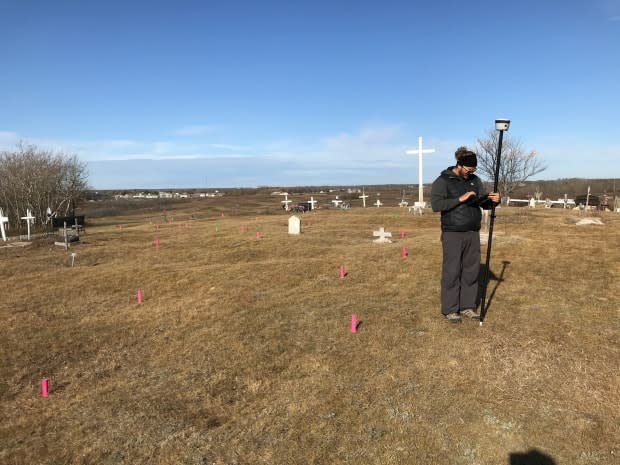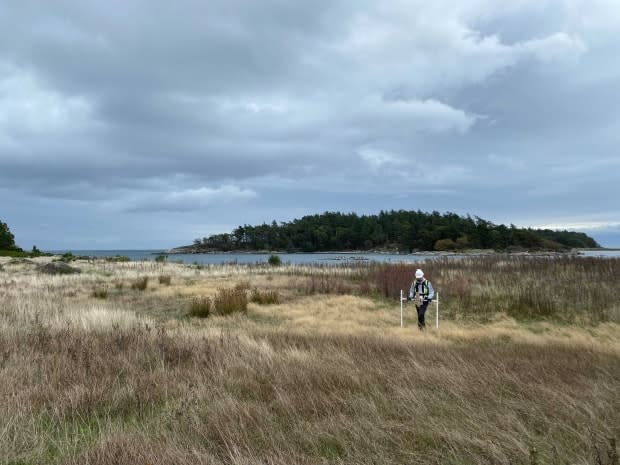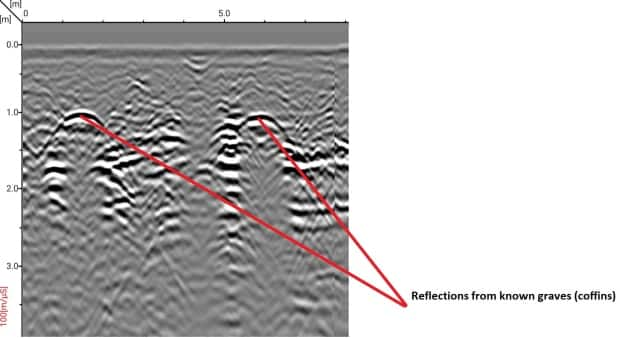New resources help Indigenous communities start process of searching for unmarked graves

WARNING: This story contains details some readers may find distressing.
Experts familiar with the complexities of searching for unmarked graves are being deluged with questions from First Nations communities wondering how to start the emotional process at former residential school sites.
There's also concern some Indigenous groups may be taken advantage of by companies offering to survey land for them without the proper expertise or technology.
That's why a group of archaeologists and academics have created free online resources answering questions and explaining the process and the complexities. They say it's a way of empowering communities to make decisions based on information they can trust.
"Some communities are prepared to move quickly and we want to ensure that this information is available to them, also available to any companies who are considering doing this work," said Kisha Supernant, director of the Institute of Prairie and Indigenous Archaeology and associate professor in the University of Alberta's anthropology department.
Supernant and her colleagues are getting questions ranging from how ground-penetrating radar (GPR) works and how to decide which company to hire, to what permits are required and the best way to honour the sites.
They created a video and FAQ, which was posted on the Canadian Archaeological Association's site on Saturday.
Supernant said it's especially important because she has already heard of companies and individuals "taking advantage of the tragic circumstances" at the former Kamloops Indian Residential School by contacting Indigenous leaders and offering to help them find unmarked graves.
"My concern with some of the companies saying, 'We're ready to come out tomorrow' is that those companies may not have the internal expertise around finding graves," she said.
"They may know how to use the technology, but the application of that technology to unmarked graves is quite specialized. And most large engineering companies or geophysical companies have likely never attempted to use this to find graves."
The resource guide initiative is being applauded by First Nations leaders and companies doing this work.
WATCH | Indigenous communities start process of searching for unmarked graves:
Long Plain First Nation Chief Dennis Meeches has already had GPR work done on parts of the former Portage la Prairie Residential School site west of Winnipeg, but says there is much more land to survey.
He said the CAA resources will be "very helpful "for leaders trying to make decisions about proceeding.
"There's got to be more research done," he said.
"There's a lot of concern that there is the possibility unmarked graves do exist at that site. So we need to be really sure and comfortable, knowing that we've done our best to to look at it and to bring some closure to it."
'Do not cause any more trauma'
Ever since news of the Kamloops discovery broke, Craig Campbell of G3Tech in Saskatoon has been getting phone calls from people asking for a weekend course on how to use the ground-penetrating radar (GPR).
"I know exactly what it's for," Campbell said.
"Companies getting ahold of me that just purchased a piece of equipment last month and they want to go and start gathering [GPR data on potential] grave sites. And I'm just advising them against it to stay away from it. Do not cause any more trauma."

It's easy to collect the wrong information and interpret the data incorrectly, he said.
"You can't just go rent this [equipment] and go decide to be a GPR surveyor. It's like getting a knife and thinking you're going to be a surgeon," Campbell said.
Will Meredith, an archeological geophysicist and GPR specialist for a Vancouver-based company called GeoScan, agreed. He said searching for unmarked graves decades old is very different from finding underground pipes or cables.
"We don't want kind of any misinformation that could cause any further pain or upset," Meredith said, adding it's not a 'show up and do' kind of job.

A lot of historical research is required and land use permits must be obtained before anyone comes to survey the area. The more accurately an archeologist or the community can pinpoint a site, the more efficient and cost effective it will be, he said.
A site survey will also determine the right technology to use — it may be different for a boggy area compared to one that is heavily forested. GeoScan typically uses electromagnetic conductivity and magnetometry in addition to GPR.
"You can't just blindly go out there and just start surveying for them. It's like looking for a needle in the haystack," Meredith said.

Supernant knows there is urgency and momentum for some communities in finally starting this work, especially with news the federal government will distribute $27 milllion to help communities locate and identify children who never returned from residential schools.
Alberta has also committed funding to research undocumented sites.
Still, Supernant said it's important not to make rushed decisions and crucial to ensure survivors and their families are supported, "that ceremony is incorporated in the appropriate ways and that all of the different nations whose children have attended any given school have the opportunity to come together and decide upon their own process."
Support is available for anyone affected by their experience at residential schools, and those who are triggered by the latest reports.
A national Indian Residential School Crisis Line has been set up to provide support for former students and those affected. People can access emotional and crisis referral services by calling the 24-hour national crisis line: 1-866-925-4419.

 Yahoo Movies
Yahoo Movies 